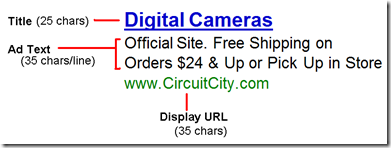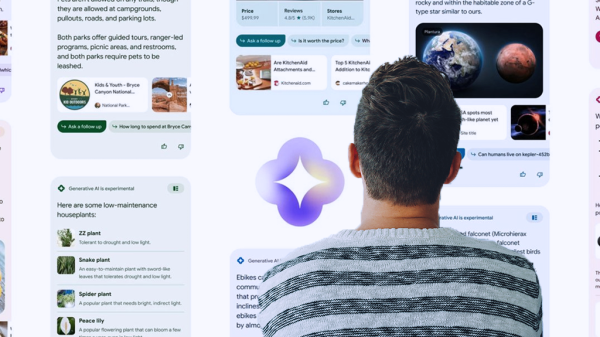
Google AdWords Strategy
I promised to talk about my AdWords strategy, which is Google’s pay-per-click system. But first – we need to be speaking the same language and have a basic understanding of the system. Let’s get some vocab and the preliminaries out of the way.
I’m going to assume we’ve all been to Google to search for something. You head over to google.com, and type in some combination of words – these are keywords. "Tucson homes for sale," "Orlando hotels," "jury duty excuses." All keywords. Yes, they’re phrases. Most people use 2-3 word phrases when they search, so just keep in mind when we talk about keywords, we’re talking about both single words and phrases.
So you type in your keywords and Google gives you results. There are two kinds of results: paid and natural. The paid stuff is what appears at the very top in the highlight, and along the right hand side. When you click on one of these paid ads, you just cost the advertiser some money – hence the name pay-per-click. Google calls it cost per click (CPC), just to be difficult. No one clicks, no one pays.
Ad Management
Google’s system for managing these paid ads is called AdWords.
Text Ads look like this:
You get a headline title, a short description, and a display URL – we’ll come back to the display URL in a different post. There are rules to the punctuation and capitalization, the sort of claims you can make, which site URL you can display. There’s a really good learning center for AdWords, a bunch of tutorials where you can learn their editorial guidelines if you’re planning on using their system. Time spent in the learning center is well worth it.
So. People with stuff to advertise sign up for AdWords, create ads, and select a bunch of keywords that they want their ad to appear for – when someone types in any of these specified set of words, show my ad. And then you bid for placement, you set a maximum that you’re willing to pay for your ad to appear. Bear in mind that the higher you bid, the higher on the page Google will place your ad, and that generally, the higher you are on the page, the more clicks you’ll get.
Another Piece…
But there’s another piece to this system.
Google wants to reward people who make good ads, use relevant keywords to their ads and their site, because that makes Google’s users have a better search experience. So they invented something called a quality score. Which of course, they don’t tell you too much about. You’ll have a relative idea of your quality score, but you aren’t going to get too many specifics. We do know that quality score has several factors, including the relevance of your keywords and your ad to your site and your click thru rate – click thru rate is the ratio of how many times people clicked on your ad and how many times the ad was shown.
The higher your quality score, the less you actually pay per click. Google wants to reward its good AdWord citizens.
The calculations are a little confusing, and really, you’ll never run these numbers because Google is going to calculate everything for you – they’re really good at knowing exactly how much to charge you, rest assured. However, I think it’s important to understand what happens in the background so you can see the impact of the quality score – and why you don’t actually pay the amount that you bid.
What About Competition??
So. Let’s say there are 3 of us, all bidding on the same phrase. For the sake of argument, let’s say we’re all selling wiffle bats, and are bidding on "wiffle bat."
Google’s going to figure all that out for you. The point is, what you pay is determined not only by what you bid and your quality score, but also on what every one else bids, and their quality score. The people with ads around you may be paying more or less than you, you don’t really know.
Pay Less For the Same Clicks
The other point is this: better quality scores mean you pay less for the same clicks. To get a better quality score, you need to have keywords that relate highly to the ad, and the ad and keywords relate highly to the site. They all agree and make sense together. One of the easiest ways to make everything agree is to be highly targeted. Go after smaller groups of niche people, show them a niche site, instead of trying to do the general words and a general site.
You set a daily budget, and that will limit your spending, and Google displays your ads evenly, more or less, throughout the day.
So we have ads, triggered by keywords, for which we’ve bid a maximum cost per click. Our maximum cost per click and our quality score determine our rank on the page, and that plus what the other guy is bidding and his quality score actually determines how much we pay, our actual cost per click.
You with me?
Kelley Koehler, aka the Housechick, is usually found focused on her Tucson, Arizona, real estate business. You may also find her on Twitter, where she doubles as a super hero, at Social Media Training Camp, where she trains and coaches people on how to integrate social media into successful business practices, or at KelleyKoehler.com, a collection of all things housechick-ish. Despite her engineering background, Kelley enjoys translating complex technical concepts into understandable and clear ideas that are practical and useful to the striving real estate agent.















































Ben Goheen
October 20, 2008 at 4:27 pm
Adwords has such a tough learning curve if you want it to work correctly. Of course most people (myself included) learn this the hard way after laying down some serious cash before deciding to figure it out.
Good posts so far. I know you’re taking it slow so everyone can follow along, just can’t wait until you get to the juicy stuff…
Matt Stigliano
October 20, 2008 at 6:56 pm
Kelley – Awesome beginning primer on Adwords. Can’t wait to see more of the series as its something I’ve stared at quite a bit, but never dove into. Thanks!
Missy Caulk
October 20, 2008 at 6:57 pm
Kelly, I use Google Ad words, I learned it myself and it was easy to set up. Then I got tired of doing it so now I have someone manage it for me and I am happy.
My experience before someone outlays a bunch of money is to make sure your site is worth having someone click through. If they get there, you pay for the click, and if the site is boring or awful, you have wasted your money.
One of my clients from Google- Ann Arbor, told me this. 70% of all clicks are organic, but the 30% of PPC are more effective, if Google knows you are doing Ad words and it is not working they will help you, by calling support.
I found this true, if I am surfing, I will go through all the organic. But, if I really want to buy, I will do the sponsored links. They are more targeted to what I am looking for. One of my highest hit posts in Ann Arbor was on the smoking ban. I still get stat’s from it. But, what does this have to do with selling real estate?
Mariana
October 20, 2008 at 9:19 pm
Sweet. I plan on integrating PPC into my business plan, but I am VERY slow to adopt something that costs $$ … until I understand it.
This is an awesome series of posts and I look forward to the following posts …
(Have fun at Jury Duty…)
Stephen Graham | New Communities
October 21, 2008 at 10:41 am
This is a good article to get a grasp of the basics of Ad Words. The method used to determine a quality score of an advertiser is mysterious — if not non-existent. One can type in “new homes in powder springs ga” and the top spots will not be specific to Powder Springs and/or new homes, but rather general terms like Atlanta or real estate, respectively. The person who ran the search would probably be displeased with the search results. Quality should take precedence over everything.
Vicki Moore
October 21, 2008 at 12:40 pm
Missy’s point is a really good one. How do you know if you have a good site?
I just looked at Google Analytics and saw that 79.79% of my visitors are first time – meaning 20.21% are returning visitors.
I’m not sure but I would think that I need to work on getting the “loyalty” up. But how does one do that? I would love for you – or someone – to address analytics. What are “good numbers”? What do we do if the numbers aren’t good?
I need to figure this out before I get on to AdWords!
Paula Henry
October 22, 2008 at 7:05 pm
This series is really interesting. I’m not quite ready to pull the plug….I’m one of those who would rather have someone do this type of advertising for me. I’ll stay tuned, though, one never knows unless they try.
The Adwords Guide
November 12, 2008 at 1:44 pm
Some good and helpful tips there and i have a better idea of adwords now.
Awesome post here
thanks
Bernell Wesley
March 30, 2010 at 9:08 pm
I’m the dude that rated you the first 5 on this article. I subscribed to you feed. Glad to have found you. Keep up the good works…